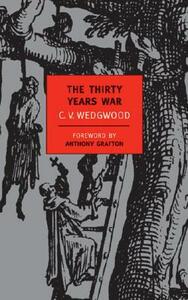Take a photo of a barcode or cover
dark
informative
slow-paced
adventurous
informative
reflective
sad
tense
medium-paced
The book that deeply involved me into Musket & Pike age. Doesn't tell much about operational and tactical features of the war, but smooth narrative reveals the main characters and their interaction along with the causes and effects of the war.
dark
informative
sad
I'm not a hundred percent sure about reviewing this because I'm not a hundred percent sure even one percent ot if went in and stayed in. I could probably take a stab at some of the causes and one or two of the main players - ok, the King of Sweden is pretty unforgettable - but I'm not entirely sure how it actually ended - the Peace Of Westphalia, obviously, but how did they get there? Lots of battles, lots of characters, lots of burning peasants' houses and fields and generating plague and pestilence - syphilis is mentioned as one of the diseases that follows an army around, all of it a monumental waste. The author is not without sympathy for almost anyone involved, except for a few standout creeps. I don't know how anyone can look at this mess and come up with the Great Man theory of history. The Small Army Of Completely Rubbish Men And Some Rubbish Women theory, maybe.
This book was loved, without a doubt, despite the lack of causality, it was a narrative feast of how.
Masterfully researched and written. It can be hard to keep a handle on the various names, micro-states, and competing interests, but Wedgwood handles it all extremely well. If there's a flaw to this book it's just that she wrote a generation too soon. There are some sections that focus on the devastations and follys that thirty years of continuous war generates, but it can get forgotten. I'd love if her skill for historical narrative had been applied to a people's history perspective.
I worked my way through this across most of 2023. It was always fascinating and had some particularly delightful prose.
dark
emotional
informative
slow-paced
An incredible account of a period that is too rarely studied.
It feels silly to say that a book about the 30 Years War was a bit confusing and the endless list of battles was pointless; that is the essence of the 30 Years War and why it's so difficult to understand or teach. This book does a great job when it settles down to talk about social history, the impact of the battles the economics of the battles, or the people involved in the battles. I got a lot of great information about Richelieu and Gustavus Adolphus and I can finally remember which one was Frederick and which two were Ferdinand. But my eyes did glaze over at some of the endless chapters about battles that went nowhere and accomplished nothing.
Read on if you want to hear about the ISIS equivalents of the 17th century. Although this book would be dramatically improved with some refreshing - footnotes on some Latin phrases Wedgwood clearly expected her more literate 1930s audience to know, and improved maps - she has a clarity of prose that vividly conveys the horror and futility of much of the war. It is interesting too, to see how someone who recently lived through the "Great War", and then WW2, brought that perspective to bear on the 30 Year War.




